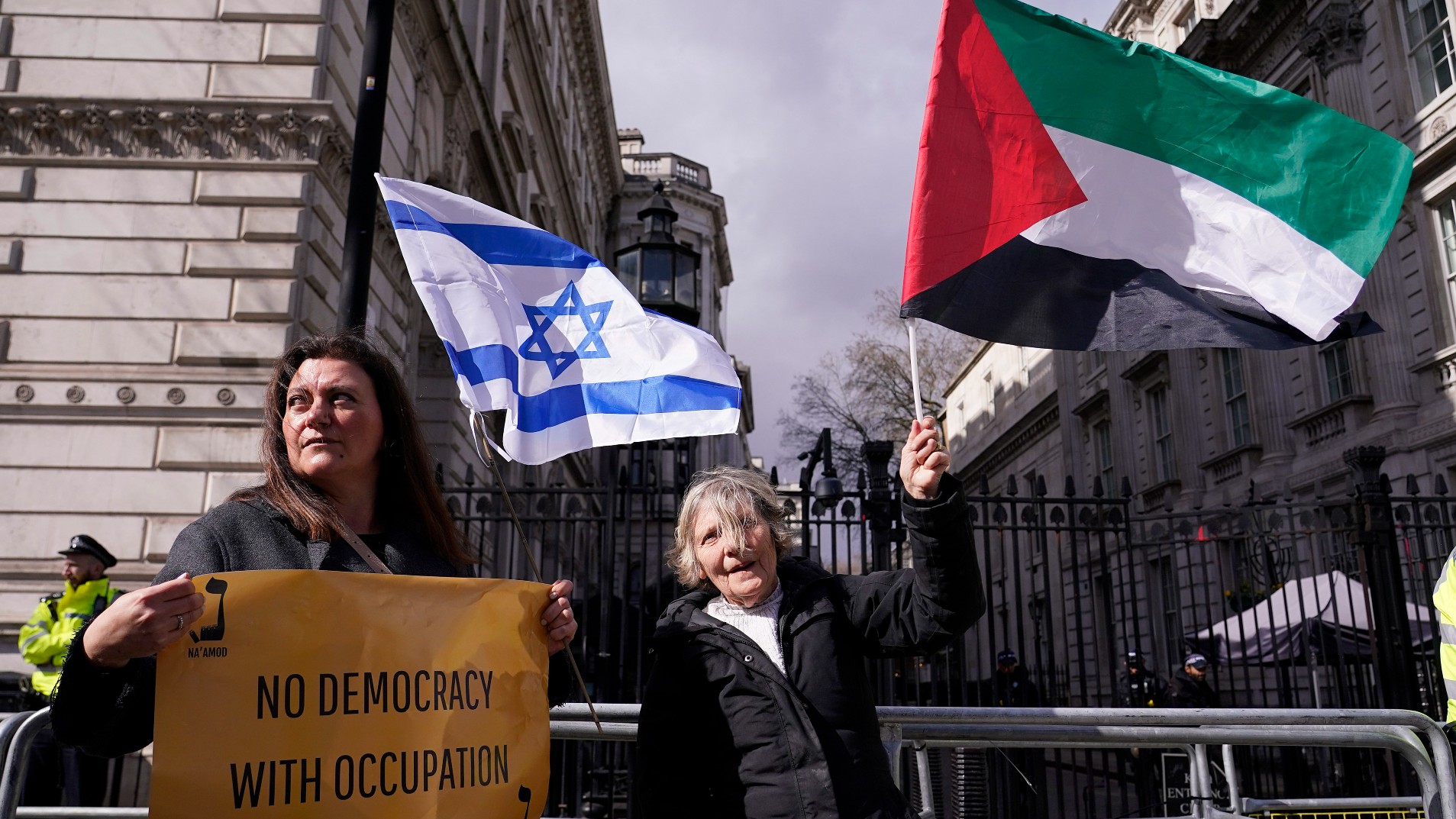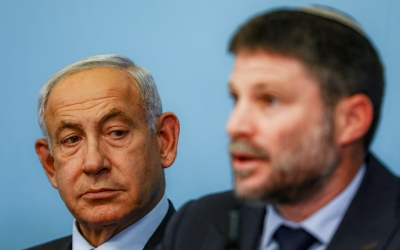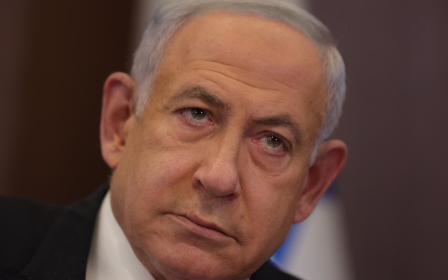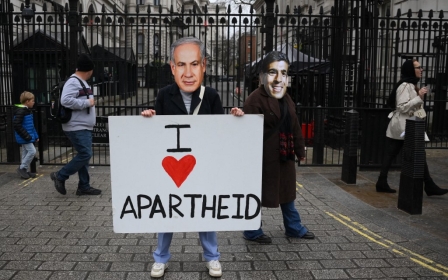Liberal Israelis and the US empowered the settler right. Now it's out of control

As Israel’s economy was shuttered and Prime Minister Benjamin Netanyahu became convinced of the need to temporarily suspend his judicial reform legislation this week, one final deal was necessary to hold together his governing coalition.
Itamar Ben Gvir, a serial racist who leads the Jewish Power party and serves as national security minister, was promised by Netanyahu that the state would move forward with creating a national guard under Ben Gvir’s authority - dubbed by some commentators as his “private militia”.
This deal speaks volumes to the intimate connection between the two crises simultaneously gripping Israel: the internal polarisation around judicial reforms, and the government-empowered escalation of extremism against Palestinians.
That connection is glaringly obvious, but rarely acknowledged in Israeli political circles. US President Joe Biden has commented acerbically on the judicial overhaul, while maintaining his studied silence on Israel’s criminal violations of Palestinian rights - indicating that Washington, too, is failing to connect the dots.
The US administration’s convening of Israeli and Palestinian officials, alongside their Jordanian and Egyptian counterparts, in Sharm El Sheikh this month and Aqaba in February, shows that Washington is set on continuing its woefully inadequate template for managing relations with Israel and the accompanying consequences for Palestinians.
New MEE newsletter: Jerusalem Dispatch
Sign up to get the latest insights and analysis on Israel-Palestine, alongside Turkey Unpacked and other MEE newsletters
While it is not every day that western journalists use words such as “pogrom” to describe attacks on Palestinians, as we saw after the recent events in Huwwara, it is every day that Palestinians experience violence and have their basic human rights trampled by Israeli soldiers, police, settler militias or a combination thereof.
When Netanyahu compared the actions of the settlers in Huwwara to those of pro-democracy protesters across the country, many people were outraged. But the strong link between Israeli policies and violence towards Palestinians, and the contestation around Israeli democracy, is incontrovertible - even if inconvenient.
Israeli society is experiencing what French-Martinique anti-colonial author and politician Aime Cesaire called the “boomerang effect of colonisation”. The work of Cesaire and others looked at how policies used on the colonised by colonial states could then be brought back to the imperial metropole and deployed against citizens.
Curtailing freedoms
Under Israeli settler-colonialism, the geographic distinction between colony and metropole is barely present - but we are now witnessing that phenomenon, whereby some of the authoritarian tools forged by the Israeli state to control Palestinians are being turned on elements of the Israeli Jewish population. Parts of that population fear the curtailment of their own freedoms.
The Israeli right’s push for judicial reforms was heavily motivated by the goal of entrenching occupation, permanently disenfranchising Palestinians, and cementing Jewish supremacy. While the courts have not prevented the gradual attainment of those goals - the massive matrix of settlements being one example of the Israeli court system’s colossal failure to uphold Palestinian rights - they nevertheless have served to obstruct and delay, and will likely be an obstacle to realising full annexation and mass expulsion.
This helps to explain why the last holdouts to Netanyahu’s stopgap compromise, both in parliament and on the streets, were from the hard-right, religious settler camp.
While Palestinians have always paid the price for Israel’s impunity, many Israelis are now discovering that it carries costs for them too
The biggest affront to democratic governance between the Jordan River and the Mediterranean Sea is not the role of Israel’s parliament in selecting judges or overriding their rulings, but rather a permanent occupation that denies democratic rights to Palestinians beyond the 1967 lines, alongside structural discrimination that confers second-class status on Palestinians within those lines.
This ongoing situation has led the main global human rights organisations, Amnesty International and Human Rights Watch, to rightly designate this reality as meeting the legal definition of apartheid. Similar conclusions have previously been drawn by Israeli human rights groups, Palestinian civil society activists, academics and politicians.
The Biden administration has expressed concerns on both the escalating violence in Israel/Palestine and the proposed judicial reforms. The US prescription seems to be the same for dealing with each: a return to the status quo ante. To put it another way, a return to security and democracy for Jewish Israelis, while neither are available to Palestinians.
There is a well-rehearsed Israeli phenomenon of screaming “crisis” whenever a US official disagrees with an Israeli policy. That is now in overdrive, including pushback from Israel’s leadership, after Biden said Netanyahu is not currently invited to the White House and Israel cannot “continue down this road” on judicial reforms (apparently, more than half a century of occupation can continue).
But words have not translated into action; there is no crisis. Indeed, a more level-headed analysis tells a different story - that Washington’s massive leverage vis-a-vis Israel remains untouched, and that the carrot-giving machine is still very much switched to “on”.
Silencing Palestinian voices
As recently as February, the US again guaranteed it would veto a resolution that was not to Israel’s liking at the UN Security Council. The Biden administration continues to nudge and cajole third countries to normalise and upgrade relations with Israel, and it is advancing Israel’s acceptance into the US Visa Waiver Program. From the spokesperson’s podium, all manner of linguistic gymnastics are employed to avoid uttering or confirming that there is an occupation.
To be clear, on the domestic front, Netanyahu has - for now - pulled back from the brink, not in response to US pressure, but rather amid unprecedented domestic opposition. Ironically, this opposition is centred on the threat of economic losses and conscientious objection to military service. Such tools, long advocated by anti-occupation and anti-apartheid advocates, have in that context been pilloried across the Zionist political spectrum as illegitimate or worse.
If negotiations on a judicial reform compromise fail, and Netanyahu resumes the shelved legislation, do not expect the US to play saviour.
For so long, the centrist and liberal Israeli political establishment invested great efforts in silencing Palestinian voices, criminalising the Boycott, Divestment and Sanctions movement, and weaponising spurious accusations of antisemitism in response to legitimate criticisms of Israel. That success is now part of their problem: the international impunity built up by Israel over decades of violating Palestinian rights is now being enjoyed by the hard-line architects of the judicial overhaul.
The US approach on the Palestinian front was spelled out most recently in the joint communique from this month’s meeting in Sharm El Sheikh, Egypt. The communique largely repeated the statement issued in February after a similar meeting in Aqaba, Jordan with the same group of participants - now apparently being referred to as the Quintet.
The gaping chasm between western rhetoric on Ukraine and its cover for Israel’s illegal actions carries real costs for the US and Europe
Full of high-sounding aspirations towards trust and peace-building, the Sharm El Sheikh communique is as dead on arrival as its Aqaba equivalent proved to be.
The most devastating inadequacy of this approach is that the US emphasis on de-escalation translates in practice into calm only for Israeli Jews, alongside continued occupation, insecurity and daily humiliation for Palestinians.
The US insistence on both sides avoiding “unilateral measures” might sound reasonable, but this both sides-ism equates Israel’s violations of international law (settlement construction, home demolitions, land confiscation, disproportionate use of force, and collective punishment for the civilian population in Gaza and elsewhere) with Palestinian efforts to uphold that same law via international fora such as the United Nations and International Criminal Court.
High geopolitical stakes
By pushing to intensify military cooperation between Israel and the Palestinian Authority, while ignoring the underlying injustice of indefinite occupation, the US is taking the position that the occupier and occupied should work together to stabilise the occupation. This helps to explain why the Palestinian ruling party, Fatah, bleeds popularity and legitimacy - and why the US (and indeed Palestinian President Mahmoud Abbas himself) refuses to support Palestinian elections, which have not taken place for 17 years.
In short, the continuing US and western policy of guaranteeing Israeli impunity - ensuring that Israel’s actions are cost- and consequence-free - acts as the handmaiden to Israel’s growing extremism. The Israeli public has empowered politicians such as Ben Gvir and Bezalel Smotrich, and Netanyahu has included them in his governing coalition, safe in the knowledge that no meaningful sanctions will follow for Israel.
Two years ago, we were two of the co-authors of a report titled “Breaking the Israel-Palestine Status Quo: A Rights-Based Approach”, which raised the alarm about the dangerous trajectory of developments, and how US policy exacerbates this situation.
But for the US and the West as a whole, the geopolitical stakes are even higher today. The gaping chasm between western rhetoric on Ukraine and its running cover for Israel’s illegal actions carries real costs for the US and Europe in the international arena. This is frequently cited as “Exhibit A” in the Global South’s dismissal of the moral claims about a western-led “rules-based” order.
Huwwara is the present, but it also offers a link to the past and a glimpse of a potential future. A second Nakba is something that Israeli right-wing politicians openly threaten with increased frequency, and for which settler militias under Israeli military cover are testing the ground.
The insipid politics of the Zionist centre and centre-left cannot reverse these trends. For outside powers, the choice is between complicity in apartheid or holding Israel accountable. And while Palestinians have always paid the price for Israel’s impunity, many Israelis are now discovering that it carries costs for them too.
The views expressed in this article belong to the author and do not necessarily reflect the editorial policy of Middle East Eye.
Middle East Eye delivers independent and unrivalled coverage and analysis of the Middle East, North Africa and beyond. To learn more about republishing this content and the associated fees, please fill out this form. More about MEE can be found here.






